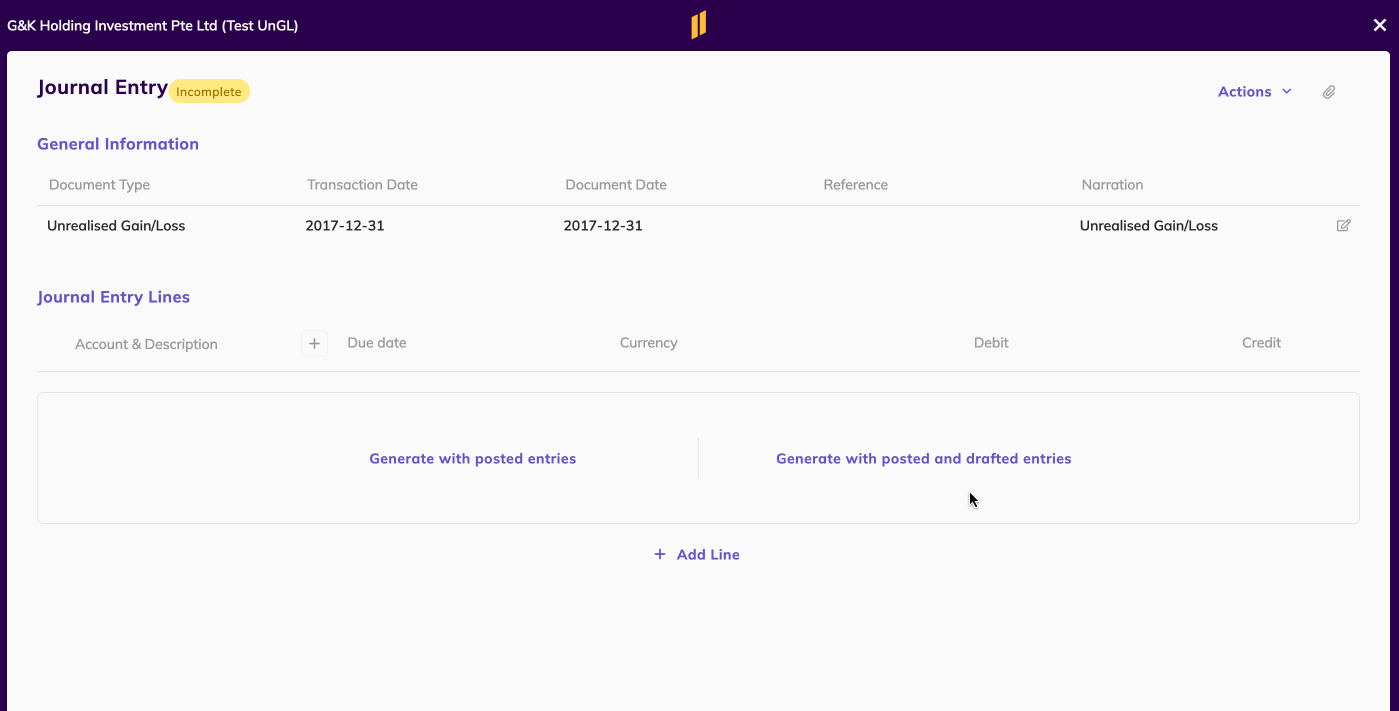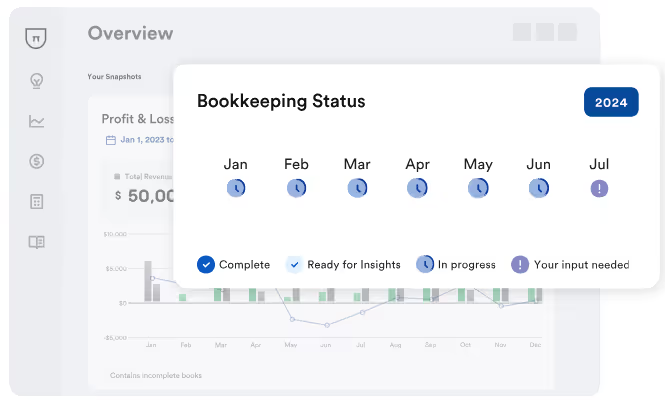Choosing Between Cloud & Desktop Accounting Software in 2023
Planning to revamp your accounting firm's tech stack? Let's compare cloud vs desktop solutions, so you can choose the best tool and upgrade your practice.
AI bookkeeping leaves routine tasks such as cording and reconciliation up to software and automation. Choosing the right tool will help you take your role from record keeper to strategic advisor.
.avif)
Automation and AI have slipped into accounting, and bookkeeping is benefiting most from it. Automate routine tasks with AI bookkeeping and make sure you offer oyour clients the best investing advice. Among the 5 best AI bookkeeping software you can find Eleven, QuickBooks Online, Xero, Zoho Books, and Bench. Are you ready for an upgrade?
In this article
It’s undeniable that accounting and bookkeeping has changed as automation tools have become more and more popular.
AI bookkeeping is implementing the use of AI-powered software and tools to automate your regular bookkeeping tasks such as transaction recording, reconciliation, and financial reporting.
These tools will be able to learn from your data in order to improve accuracy and efficiency, while reducing human errors.
Basically, AI bookkeeping doesn’t aim to take over your business but to automate tasks and processes that are time-consuming and prone to error. Through machine learning, it can also predict future behavior, offer insights, and help you detect fraud.
This is an concern that is present in many bookkeepers who are still hesitant to switch to AI bookkeeping.
First of all, no, AI will not make the role of bookkeepers irrelevant. It simply means that bookkeepers will begin to adopt new roles.
Traditionally, bookkeepers managed daily financial records, balanced accounts, and ensured accurate reporting.
With AI, most of these tasks are automated. Except for revisions. After all, your results are only as good as the quality of your data.
Bookkeepers who use AI accounting tools shift from data entry to roles that emphasize financial oversight, compliance, and strategic insight.
AI doesn’t replace bookkeepers, it enhances their capabilities, allowing them to focus on other tasks that can provide valuable advice to their clients, such as cash-flow advice or spotting irregularities.
Using AI in bookkeeping means you are adding smart automation to your workflow, therefore saving time, improving accuracy, and helping you make better decisions.
AI tools can be integrated into daily operations to handle repetitive tasks, provide real-time financial insights, and flag potential issues before they become problems.
We’ll show how AI can impact 3 actual scenarios in bookkeeping.
You manage the bookkeeping of an e-commerce store and sell your product in multiple countries and multiple currencies.
The issue here would be reconciling daily sales from different payment gateways (for example Stripe, PayPal, Shopify) with bank deposits, as it is time-consuming and prone to error.
If you integrate an AI bookkeeping tool, it could automatically pull transaction data from all sources, match them against deposits, and reconcile them quickly and accurately. It would even detect transaction fees and currency conversion gains and losses.
The result is saving hours of manual work, therefore freeing up your time to focus on cash flow planning and supplier negotiations.
Result: What previously took hours every week was completed in minutes, freeing up the bookkeeper to focus on cash flow planning and supplier negotiations.
You’re in the finance team in a marketing agency where you, and most teams, work remotely and you receive dozens of recurring software subscriptions daily.
The problem is that your team is spending way too much time manually categorizing frequent (but different) expenses including software tools, ad expenses, and other payments.
If your team was using an AI-driven bookkeeping system, it would start learning from past categorizations and automatically tag transactions based on vendors, frequency, and amounts.
For example, it could recognize “Google LLC” as a marketing expense, and “Slacak Technologies” as a communication tool
This would lead to a jump in categorization accuracy to over 95%, and monthly closings speeding up by 40%.
You’re keeping the books for a construction company that manages dozens of vendors and subcontractors.
Your main pain point is that you stumble accross many duplicate and inflated invoices that have accidentally slipped through approval. This leads to overpayments and scary deficits in your books.
Not ideal.
An AI bookkeeping software would analyze historical vendor patterns and flag invoices that are 30% higher than usual and have arrived out of schedule. Additionally, it detects all duplicate invoices that are submitted under slightly altered vendor name.
This would help you save your company from mistaken payouts (that could escalate pretty quickly) and tighten your management control in the future.
Your tasks can vary from managing complex multicurrency transactions to simply trying to close the books faster, but using AI in bookkeeping can help you reduce manual effort, prevent errors, and help your team work smarter.
Including an AI bookkeeping tool will offer many benefits.
By automating processes such as adding routine entries and reconciliations, you will be saving at least 40% of your time, leading to an increased productivity and scalability.
Without having to implement new systems, adding man power or manual labor, you take on more clients and expand your firm. The best part is that with AI you won’t have to worry about making wrong decisions, as you will receive insights into your books that will improve your cash flow management.
Additionally, AI bookkeeping software will (generally) help you avoid human error and intercept any possible inconsistencies thank to machine learning, therefore reducing the chances of fraud and legal issues.
Finally, AI bookkeeping software will allow you to have easy access to your updated books, anywhere and at any time.
If you’re looking to include an AI bookkeeping tool in your tool stack, you should know that not all tools will be the best fit for you.
You will need a powerful software that combines automation, intelligence, and reliability, but that also meets your specific needs.
Here are some must-have features that you should look out for before you make your decision:
The software should automatically categorize income and expenses based on past behavior, vendor patterns, or keyword rules. This will help you save hours of manual entry.
Direct connections to your bank accounts, credit cards, and payment processors allow the system to pull in transactions in real time and keep your books always up to date.
Being able to operate in multiple currencies automatically will help you expand your firm and not be limited to a specific location and client. Look for platforms that fetch real-time exchange rates, convert automatically, and track gains and losses.
AI bookkeeping tools should generate, send, and follow up on invoices automatically, even recognizing late payments and issuing reminders.
Matching bank transactions to invoices, payments, or receipts using AI logic speeds up reconciliation and reduces the risk of human error.
AI should flag unusual transactions, duplicate charges, or missing invoices, acting like an intelligent financial watchdog that improves data integrity and helps you raise the bar for accuracy.
The best tools won’t be limited to automating routine tasks, they will also learn from historical data and performance.
Machine learning will offer smarter and personalized recommendations and will be able to flag anomalies much easier.
This feature will also help build an accurate cash flow forecast that uses payment behaviors to provide deep insights.
When choosing your tool, it is important that you analyze the tools you currently use and if your bookkeeping tool could integrate with them.
Some tools you need include a CRM, inventory system, payroll, taz platform, etc.
Eleven includes all of these essential features, focusing on multicurrency automation, real-time reporting, and global compliance.
If you’re ready to consider an AI bookkeeping software, we’ll leave you with 5 of our favorite options that can become real assets for your firm.
Eleven is a complete AI-powered accounting platform that is designed for accounting firms who need powerful multicurrency accounting and automated bookkeeping.
Unlike other bookkeeping tools, Eleven focuses on real-time financial clarity across currencies, regions, and teams, making it ideal for startups and scaling companies operating globally.
Some other features include:
Best for:

✅ Pros:
❌ Cons:
QuickBooks Online is one of the most popular accounting platforms for small and mid-sized businesses.
The Advanced plan includes enhanced features like smart reporting, automation, and limited AI categorization.
Some features you can find are:
It’s well-suited for U.S.-based teams with standard accounting needs, freelancers, and firms who have basic accounting workflows.

✅ Pros:
❌ Cons:
Xero is a clean, cloud-based accounting software designed for businesses with remote teams or international vendors.
It is a good choice for creative, tech, and service-based industries.
It offers strong automation and a global-friendly interface.
Among its features you can find:

✅Pros:
❌ Cons:
Zoho Books is part of the Zoho enterprise.
In addition to a seamless integration with other Zoho products, it offers AI-powered bookkeeping features and automation options for businesses already using Zoho tools.
It’s ideal for lean teams that want detailed control over workflows, including startups, SaaS buisiness, and other tech savvy teams.
Some bookkeeping features include:

✅ Pros:
❌ Cons:
Bench is a hybrid bookkeeping service that combines AI software with a dedicated human bookkeeper.
Unlike traditional DIY software, Bench handles your books for you, which is ideal for founders who want minimal involvement in bookkeeping.
This is a good choice for solo entrepreneurs, founders of small businesses that lack an in-house finance team.
Some features include:

✅ Pros:
❌ Cons:
Now you know why you should add an AI bookkeeping tool to your current tool stack.
However, choosing the perfect tool will mark the difference between a valuable asset and a mess of numbers.
Use this checklist when choosing your tool:
If you’re ready, why not try Eleven now?
No, AI will not replace bookkeepers or accountants.
We understand that this is a pressing (and scary issue) but bookkeepers are still necessary to manage a business’ accounting needs, especially when we are dealing with large enterprises.
However, it is important that you understand and keep up with the new trends so you don’t fall behind.
Yes, AI can handle many bookkeeping tasks such as categorizing transactions, reconciling accounts, generating financial reports, and even detecting anomalies.
AI-powered bookkeeping tools like Eleven can automate up to 80–90% of routine bookkeeping tasks, reducing errors and saving time.
However human oversight is still essential to ensure it all runs smoothly.
ChatGPT can help explain bookkeeping concepts, assist with categorization rules, interpret financial reports, or guide you on how to use specific software.
However, it doesn’t connect directly to your bank feeds or accounting system, so it can’t fully automate your books.
Absolutely.
You can automate bookkeeping using AI tools that handle data entry, bank reconciliation, invoice matching, report generation, and even tax compliance.
Tools like Eleven, Zoho Books, and QuickBooks offer varying levels of automation based on your needs, especially useful for startups, remote teams, or businesses with international operations.